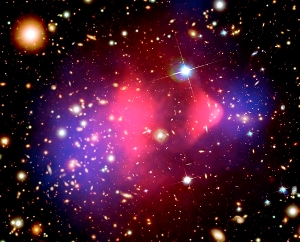|
Dark Matter
The direct detection of dark matter
is one of the biggest contemporary challenges in experimental physical. Evidence
that the matter in the Universe is dominated by an invisible component has been
accumulating for many years, initially from measurements of the rotation curves
of spiral galaxies, and the speeds of individual galaxies within clusters; and
more recently from precision measurements of the cosmic microwave background.
Astrophysical evidence, together with precision cosmology results suggest that
in a ΛCDM model there are contributions from dark energy (68%), baryonic
matter (5%) and dark matter (27%).
Particle physics theories provide a possible explanation for dark matter in
the form of WIMPs - weakly interacting massive particles. WIMP candidates
include the neutralino, a possible lightest supersymmetric particle; and
Kaluza Klein particles associated with compactified extra dimensions. Particle
accelerator experiments such as those at the LHC
aim to produce these particles;
however the only way to conclusively show that they account for dark matter in
the galaxy, would be by the confirmed discovery of direct WIMP interactions.
This is the aim of direct dark matter search experiments, such as LUX-ZEPLIN
The scattering cross section of a supersymmetric WIMP off atomic nuclei is
expected to be very low, around or below 10-10pb, corresponding to
only a few events a year in a one tonne detector. Detecting such rare events
requires very sensitive detectors with excellent background discrimination.
|
|

Image of the Bullet Cluster (1E 0657-56). The distribution of dark matter
(shown in blue) can be inferred from gravitational lensing. This is separated
from the distribution of hot gas (shown in red), supporting the dark matter
hypothesis. Photo NASA. |


